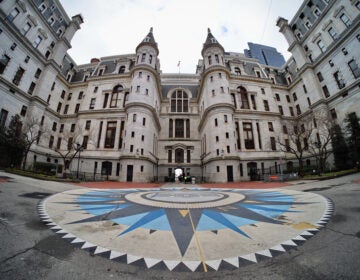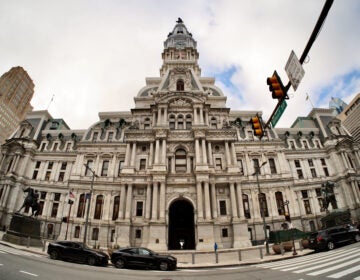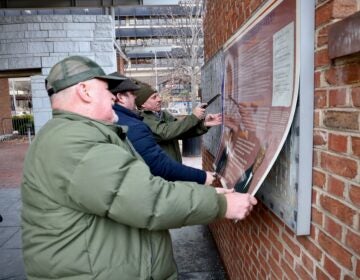Philly Council bill seeks to give city workers affordable housing preference
Thousands of homes will be built under Philadelphia’s Neighborhood Preservation Initiative. A Council bill proposes purchase preference for municipal workers.

The Philadelphia skyline is pictured at night during the fall of 2021. (Mark Henninger/Imagic Digital)
Philadelphia City Council is considering legislation that would give a buying preference to municipal workers eligible for workforce housing.
Introduced Thursday, the bill has direct ties to the Neighborhood Preservation Initiative, the massive bond-backed program initiated by Council President Darrell Clarke to increase the city’s stock of affordable housing, revive commercial corridors, and improve neighborhood infrastructure, among other priorities.
Under NPI, the city is expected to oversee the construction of 5,000 units of workforce housing, a term typically used to describe housing that is affordable to households earning between 60 and 120 percent of area median income (AMI). If the new measure passes, thousands of city employees, many of whom are required to live in Philadelphia, will have a competitive advantage when those homes hit the market.
For now, it’s unclear how much the houses, backed by federal dollars, will cost to build, what they’ll be sold for, or where they will be located. But Clarke, whose office drafted the bill, suspects there would be considerable interest from eligible employees, including members of the city’s blue collar worker union — the American Federation of State, County and Municipal Employees District Council 33.
“The head of D.C. 33 told me that we’ll have a line around the block when we roll this out, and I said ‘Looking forward to it’,” said Clarke in an interview.
Earnest Garrett, the union’s president, could not be reached for comment.
The bill comes while housing prices in the city remain elevated amid a tight market marked by fierce competition. The median home price in the city is now $245,000, a scale Clarke said is “locking out” middle-income residents from homeownership, including municipal workers.
Annual salaries for many D.C. 33’s 10,000 members sit below $60,000, according to city records.
“That’s what we’re attempting to attack as it relates to this initiative,” said Clarke.
The bill, modeled on a program in New York, is scant on details. As written, it defines workforce housing as housing affordable to households earning up to 120 percent of AMI. In Philadelphia, that translates to more than $100,000 a year for a family of four.
The measure calls on the city’s Office of Housing and Community Development to develop regulations for the program and implement them. The legislation does not detail a timeline for that process.
In the meantime, affordable housing advocates and urban policy experts that spoke to WHYY say Clarke’s proposal has merit considering Philadelphia’s hot housing market and the requirement for many municipal workers to live in the city.
Richardson Dilworth, who teaches community economic development at Drexel University, said the legislation could also help recruit and retain residents who work for the city.
“It seems like a straightforward addition to the benefits package for city workers,” said Dilworth.
 WHYY is one of over 20 news organizations producing Broke in Philly, a collaborative reporting project on solutions to poverty and the city’s push towards economic justice. Follow us at @BrokeInPhilly.
WHYY is one of over 20 news organizations producing Broke in Philly, a collaborative reporting project on solutions to poverty and the city’s push towards economic justice. Follow us at @BrokeInPhilly.
WHYY is your source for fact-based, in-depth journalism and information. As a nonprofit organization, we rely on financial support from readers like you. Please give today.









